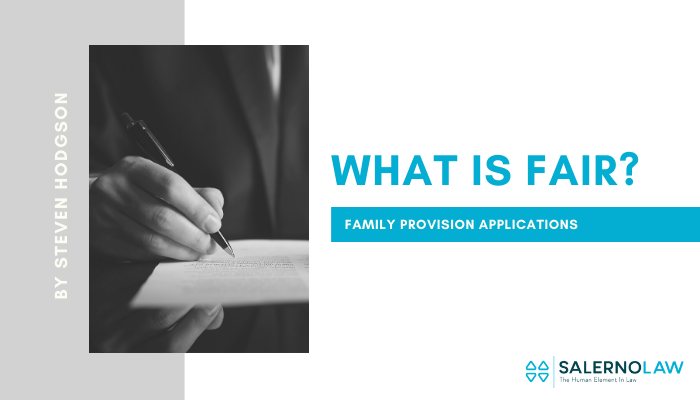Everyone knows someone, who has complained about being unfairly cut out of a family member’s Will even though they were dutiful, loving, and supportive all their lives. Fortunately for them, Australian law has a handy legislative mechanism called a family provision application, whereby they can make a claim through the courts in an attempt to vary that person’s Will to right the wrong that was done to them and get what is fair. This can be especially beneficial if this person has fallen on hard times, as a family provision application can provide a significant windfall that can be a real lifesaver these days.
Alternatively, many people would have also had a conversation with a friend or family member about the flip side of this coin – this person (the testator) wants to have their Will drafted but they are worried that their insolent trouble-child, who they reasonably left out of their Will after a sudden estrangement following a big fight last Christmas, will challenge their Will. Unfortunately, no matter how much estate planning they do, the testator cannot prevent that trouble-child from spitefully bringing a family provision application to the detriment of the other beneficiaries (as their respective shares are reduced to allow for the challenger to receive a cut) after the testator is gone. This seems fundamentally unfair however every state and territory in Australia has legislation to allow disappointed beneficiaries to challenge a Will, if they are eligible.
There are no uniform family provision laws in Australia that define what an “eligible person” is, but they generally are:
- Surviving spouse or de facto
- A child (including step and adopted)
- A dependent
And they generally are not (unless they are also dependent):
- Parents
- Grandchildren and grandparents
- Cousins, nieces, nephews, aunts, uncles
- Housemates
- Neighbours
- Gypsies, tramps, and thieves
- Cats
In either scenario, testamentary freedom is never absolute as disappointed beneficiaries, who are eligible, may apply to the court to vary the testamentary wishes of a deceased’s final Will for further or better provision from the deceased estate for their proper maintenance and support. And while, courts do not do this frivolously as their initial position is to respect and uphold the wishes of the deceased, nowadays, family provision applications can be extremely lucrative, and are becoming more and more popular, especially considering Australia’s aging population, and estates growing larger due to the surge in the property market.
While it does seem unfair in some circumstances and fair in others, this is the Australian legal landscape that all testators should bear in mind and disappointed beneficiaries should explore.
But what is fair? Well, that is a question for a court to decide. However, Salerno Law’s team can provide timely and lucid advice on potentially making a family provision application or defending against one.




Leave A Comment